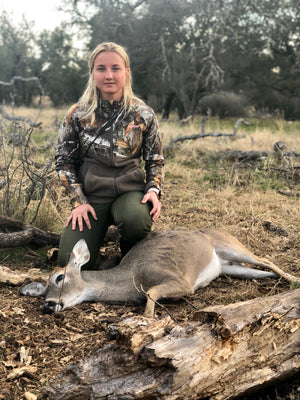My legs were shaking so hard that I temporarily forgot why I was in the middle of the woods holding a gun. What was I doing here again? Is this a dream? No, I reminded myself. I’m here to hunt. I looked over at my mentor, Davis Collins, who seemed concerned about my condition. “You need to get off the metal chair,” he whispered. “You’re shivering too much to take a good shot.”
He was right. We had been in the blind for two hours, and the sun was beginning to rise. I thought the light would bring warmth, but the cold only sunk deeper in to my bones. I started scolding myself about the clothes I had chosen to wear before finally accepting Davis’ advice. I set down the gun, got off the chair, and tried moving in an attempt to warm my body while making as little noise as possible. Davis is a good friend, but the rawness that comes from the prospect of killing brings a closeness that would have allowed me to accept advice from a total stranger.
Third time's a charm?
This was the third time I had been out to ROAM and spent a freezing morning in the blind. The first time, I took a shot at a mature doe and completely missed her. However, Davis shot a deer, and he patiently showed me how to clean an animal for my first time. As we removed the skin and meat—still warm with life—I became intoxicated by the fragrant intimacy of an animal that had been running around the land just an hour before. I was eager to feel this same sensation heightened with an animal that I had harvested myself.

The second time, I didn’t shoot anything. Per the landowners’ request, I was to shoot a doe or a “spike,” a male deer that is at least 1.5 years old and has unbranched antlers. This time I didn’t get a good shot at either of those. A buck tormented me with a perfect broadside shot for what seemed like hours, teaching me the importance of patience as a part of this process. If you cannot wait for the right shot, then you really don’t deserve the kill.
So here I was—hoping the third time would bring more luck. By the time I warmed up, the deer were gone. Once I came back to reality, the exhaustion and disappointment began to set in. We had woken up around 3 a.m. to get out to ROAM Ranch before sunset. Driving under a stunning full moon, we saw deer and other animals feeding under the moonlight alongside the roads. I had felt both weary and excited—today was the day. Now, my hands and feet were numb, the sun was up, and I was starting to doubt my own ability to shoot a deer.
The moment of truth
We stayed on the property to wait for an evening hunt. The sun came out, and it turned into a glorious day. We set up towers on the property and explored—discovering new game trails and vantage points along our way. My body and spirit warmed, and I shook off the cold fruitless hunt of the morning. We ate a delicious meal and felt grateful for the abundance of the moment despite the discouraging morning. We headed back into the blind around 3 p.m. with high hopes.
We knew the feeders were not going off until close to sunset, so Davis set them off manually so that we would have opportunities to shoot before it got too dark. It was a gamble, but it worked. Five minutes after Davis made it back to the blind and the noise and scent had died down, the deer started to come out.
First there were only small does, and then I spotted a spike. Since mature bucks were not an option for my first shot, I was hoping for a spike that night. The does were often with their young, which made it difficult for me to imagine killing one. I knew the aftermath would likely include confused fawns left without their mother to brave the wild. So, when a spike appeared from the brush, I felt a rush of adrenaline. That was the one.
I took the shot, and it felt right. The deer went down instantly, and the others scattered. I was shaking again—but this time it wasn’t from the cold. We waited for a few minutes to make sure he wasn’t still alive, which felt like hours. I wanted to make sure that the deer was free from suffering—that I had done my job with integrity and respect for Nature.
As I approached the deer, he looked peaceful. When I was sure he was dead, I started to imagine the life he had lived freely on the land until seeing him just 30 minutes prior. I gave thanks to Nature for providing this deer as a lesson as well as sustenance for many months to come.

Lessons learned
We cleaned the deer as the sun set. I had never looked at meat with such reverence. I was well aware that other animals were sacrificed to make my life possible, but becoming a part of the raw process was humbling. As we drove away from the ranch—this time under a dark sky as the clouds were covering the moon—I felt a sense of wonder and awe for the world around me.
The next day, I cooked up one of the deer loins. I chewed each bite with the awareness that I was assimilating the deer’s energy into my own. It was the most intimate eating experience I had ever had, with the animal's eyes and body heat still etched in my memory.
Since then, I have been even more particular about the meat I choose to eat and have found myself wanting less of it overall—perhaps because I realize the true responsibility behind being an omnivorous human. I have been more open to the subtle difference in energy I experience after I eat meat from an unknown source—compared to how I feel after I eat meat harvested by myself or someone I know.
The biggest lesson I learned, however, is more existential. I realized that we as humans have removed ourselves so far from Nature that we somehow feel above it. That we have forgotten that Nature provides everything we need when we coexist in harmony. And, with a newfound gratitude for all of Nature's sustenance, I am reminded that the process is far more important than a final outcome.



